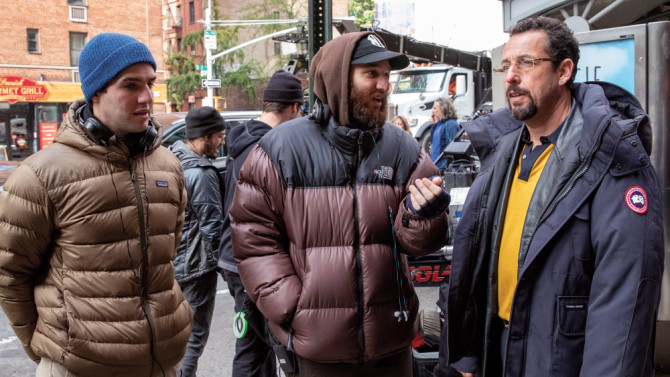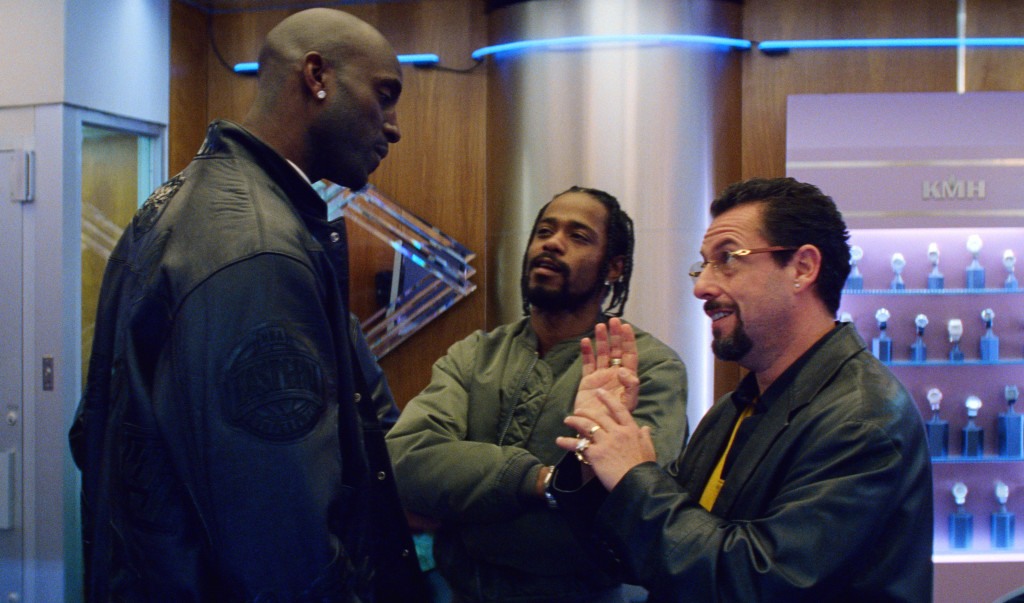I finally finally FINALLY got to see Uncut Gems this weekend and, Holy Moses, it did not disappoint. This would have been my number one movie in 2019 had I seen it in the theaters.
After watching the film, I do what I always do when I see something good, which is watch a thousand Youtube videos about the making of the film. And one such video caught my interest because it stated something I’d never heard before.
Until this moment, the script I’d heard had the most rewrites was Good Will Hunting. Nobody kept track. But rumors push it somewhere between 60-100 drafts. Well, it turns out Uncut Gems puts that number to shame. The Safdie Brothers, who directed the film, wrote 160 drafts of the script over a ten year period.
Now before you feel guilty about having submitted your script to The Last Great Screenwriting Contest with only three drafts, it’s important that we distinguish why some of these Uncut Gems rewrites were made.
When you’re directors or you’re a screenwriter working with a team of people trying to get a movie made, you’re constantly sending the script out to talent and every time you do that, it’s advantageous for you to cater the script to the actor you’re sending it to.
The Safdie Brothers point out that they went through numerous NBA stars to try and find the professional basketball player character in their movie. Since they’re Jewish and Howard (the main character) was Jewish, they had Amare Stoudemire as the original character since he is Jewish himself.
But then they heard that Kobe Bryant was looking to do some acting. Kobe is a completely different person than Amare. Not to mention, he existed in another stratosphere of stardom. Naturally, they had to rewrite the character to reflect this difference.
In the end, Kobe decided that he didn’t want to act. He was more interested in directing. So that casting choice fell by the wayside. Now imagine going through that over and over again. Anybody who’s tried to get a movie made understands this hell.
At this stage in the game, though, as an amateur writer trying to get noticed, you don’t have to worry about these kinds of rewrites. But then how many rewrites should you be writing?
I realize this is a gray area. A draft to one person may be quick and dirty while a draft to someone else might be a full-on teardown. One writer may even vacillate between those two kinds of rewrites, depending on what stage the script is in. There are also specific types of “passes.” You can do a dialogue pass where you go in there, read all the dialogue, and try and spruce it up. You might do a character pass where you focus on a specific character in a rewrite and try to make everything about him/her pop more.
But let’s say we’re averaging all of these together – both the long arduous structural rewrites and the quick and dirty dialogue polishes. I’d say that you need at least ten drafts to bring out the best in a script. And it’s probably closer to 20.
But there’s good news. There are things that can knock this number down. For every three screenplays you’ve written, knock one draft off your total number of drafts per screenplay. That’s due to you knowing more and getting more right early on. Knock two drafts off if you do extensive outlines. And one draft off if you do character bios.
The cause for the longest rewrites usually come from structural problems and the writer not having a good feel for the main characters. You can alleviate some of that if you do the work beforehand.
However, there’s a truth about screenwriting that not a lot of people like to talk about that tends to stretch your workload into the 15-25 draft territory. And that’s that the original concept you went into the script with will often change.
At some point, you’re going to realize that there’s a better version of your story. And in order to get to that version, you need to do a page 1 rewrite. It’s one of the worst parts of writing a script. Cause you think that the last five drafts of writing the script were now pointless.
And the sad part is that a lot of times, we’ll hold on to that original idea simply because we don’t want to face reality. But it’s not as bad as you think. Your story is radically changing, yes. You’re starting over, yes. But because of those previous drafts, you know this world WAAAAY better than you did when you first started. So the new version of your script will be more populated with a lot more specificity.
It’s funny because that very topic comes up in the 160 Draft Safdie Brothers video I watched. Josh Safdie talks about how he used to lie as a kid and he learned that the more specific he could make the lie, the more details he could add, the more believable the lie would be. Cause people would think, “There’s no way that could be untrue. There’s just too much detail.” So he incorporated that approach into their movies. The more detail you add, the more we’re going to believe this story is really happening.
But getting back on topic, if there’s no way you can imagine writing 15-20 drafts of a script, you have to adjust your approach even more. For example, you will need a super detailed outline. You will need to pick a subject matter that you’re familiar with. For example, with Jason Gruich who wrote Cop Cam, he *IS* a cop. If he wasn’t a cop, people are going to be pointing out all the errors in procedure and how police precincts don’t work that way. Those things require more drafts to fix.
You’ll also want to pick simpler stories. John Wick is going to be an easier script to write than Mission Impossible. Why? Cause there are less moving parts. That’s where screenwriting gets tough – when you’re managing multiple storylines, when you’re managing multiple character threads. But the real time wasted is having all those plot and character threads come together in an invisible way.
I suspect one of the reasons Uncut Gems took so many drafts to write was it’s a very dense plot (even though the movie is good at hiding it). Howard loans out the “uncut gem” to Kevin Garnett, who leaves his championship ring for collateral. Howard then pawns that ring in order place a bet on a basketball game. He needs the uncut gem back from Garnett the next day in order to enter it into the auction where he hopes to cash it in for a million bucks. Howard has a wife who’s pushing for divorce. He’s got a mistress who he can’t decide if he wants to run away with. And he also has outstanding debts with three different bookies around town, not to mention a side business of employing a dude to bring rich athletes to his jewelry store. I don’t care who you are. You do not figure that out all in one draft.
And I think that’s the way you have to look at it. Yeah, draft-writing is mainly problem-solving. You’re fixing plot developments that don’t work. You’re adding texture and depth to your weaker characters. You’re juicing up your final act with a better location. But draft-writing is also the primary process for discovering new ideas. Every time you write a new draft, you get new and better ideas that you can put into the script. The more you do that, the better the script gets.
And believe me, I can tell. I can tell when a writer hasn’t put a lot of work into a script. Yesterday’s script was a clear four-draft script to me. It’s that point where the writer understands what his movie needs to be but he hasn’t been with the script long enough to integrate all the changes needed to execute that vision.
With all this being said, if you’re 20+ drafts into your script, you have to start asking if you’re making the script better with each new draft. Sometimes writers write drafts that only make things different, not better. And that’s a dangerous pitfall to fall into.
How do you know when you’re finished? When there are no more drafts to write? That’s never an easy question to answer. For each writer, it’s different. For each SCRIPT it may be different. But for me it was when the time it’d take to write a draft was more laborious than the percentage of improvement a new draft would bring. And that was usually around 15 drafts. So I think that’s a good gauge to start asking if the script is good enough to keep rewriting. Cause sometimes it isn’t and you have to let a script go. But if something feels good and you have that feeling that it’s almost there, then by all means, keep writing those drafts.
I’ll throw the question to you guys. How many drafts do you write?
Carson does feature screenplay consultations, TV Pilot Consultations, and logline consultations. Logline consultations go for $25 a piece or $40 for unlimited tweaking. You get a 1-10 rating, a 200-word evaluation, and a rewrite of the logline. They’re extremely popular so if you haven’t tried one out yet, I encourage you to give it a shot. If you’re interested in any consultation package, e-mail Carsonreeves1@gmail.com with the subject line: CONSULTATION. Don’t start writing a script or sending a script out blind. Let Scriptshadow help you get it in shape first!



